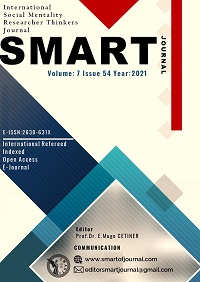Author :
Abstract
Tekstil sektörü, ülkelerin ekonomisine büyük yarar sağlayan ve özellikle hazır giyim sektöründe düşük maliyet ve yüksek kar elde etmek isteyen ülkeler için elverişli bir sektördür. Dolayısıyla sektörün ülkelerin ekonomisine katkısı oldukça yüksektir. Bununla birlikte teknoloji de her alanda gelişmeye ve kendini yenilemeye devam etmektedir. Her sektörde etkisi görülen bu gelişmeler, bankaların ve kurumların bu duruma adapte olması ve özellikle ödemelerde farklı uygulamaların ortaya çıkmasına zemin hazırlamaktadır. Bu anlamda ortaya çıkan sanal paralar, kağıt paraya göre merkezi olmayan bir sistem ağı altında işlev görmektedir. Milyonlarca insanın kısa sürede yatırım aracı olarak da gördüğü kripto paralar, henüz alışverişte kullanılmaya başlanmasa da, birçok firma bu konu ile ilgili çalışmalar yapmaktadır. Blok zincir teknolojisi ve beraberinde gelişen kripto paralar ile takas edilemeyen jetonlar (non-fungible tokens, NFT) özellikle günümüzde sanatçılar ve şirketler tarafından dikkat çekmekte, hazırladıkları koleksiyonları özelleştirmeleri ve büyük NFT araçları karşılığında satma durumları söz konusu olmaktadır. Dolayısıyla gücünü ve kalitesini devam ettirerek yakın gelecekte değişim aracı olarak tekstil sektöründe de kullanılacağı öngörülmektedir. Bu durumun en önemli etkenlerinden biri de ülkelerin büyük sanal para ağlarını kendi ülkelerinde ödeme aracı olarak kabul ederek kullanması olacaktır. Bu çalışma kapsamında da dijital dönüşümün parametreleri, tekstil sektöründe blok zincir, kripto paralar, NFT uygulamaları irdelenecek olup, sektörel örnekler ile konunun sürdürülebilirlik açısından önemi analiz edilecektir.
Keywords
Abstract
The textile sector is a suitable sector for countries that provide great benefits to the economies of countries and want to obtain low costs and high profits, especially in the ready-made clothing sectors. Therefore, this industry makes a significant contribution to each country's economy. Furthermore, technology is always evolving and renewing itself in all areas. These developments, which have repercussions across the board, pave the way for banks and institutions to react to the situation, as well as the introduction of new applications, particularly in payments. In comparison to paper money, developing virtual currencies operate on a decentralized system network. Cryptocurrencies, which have been popular as an investment instrument among millions of people in a short period of time, have yet to be utilized in shopping, although many companies are working on it. Artists and companies are particularly interested in cryptocurrency and non-fungible tokens (NFT), which have emerged as a result of blockchain technology, because they may customize their collections and sell them in exchange for enormous NFT tools. As a result, it is expected to be employed as a method of change in the textile industry in the near future while preserving its strength and quality. The usage of huge virtual currency networks by countries as a means of payment in their own countries will be one of the most important aspects in this circumstance. The characteristics of digital transformation, blockchain, cryptocurrencies, and NFT applications in the textile sector will be investigated in this study, as well as the importance of the issue in terms of sustainability, using sectoral examples.





